#libre software
Text
What is F(L)OSS about really? (Preview #1)
youtube
What is licensing, ownership and rights about?
I often describe such throughout the software domain but can easily be applied almost everywhere in society, like in hardware and culture. If I am not mistaken, it pertains to what you actually is your own, either it is home, furniture, computer hardware, software, artistic media, equipment, et cetera. Licensing is similar but has a more autonomous / shared ownership meaning applied.
And the reason why I believe that matters so much is because while the majority (of the human bell curve of demographics*) oftentimes ignore and brush off their personal agency on the wider scale of human planetary affairs, that attitude of distributing their energy & efforts towards current grand managerial bodies like big corporations and big governments is a quite short-sighted perspective and has a quite negative impact in our present day and potential future(s). It is not exclusively negative one-sided story but still, profiteers are not providing enough value for what you invest into their zone of control, monetary or otherwise... and that is very concerning considering the current global society context and the decisions made by such staff of managers & "drones".
The non-profit organization that is Creative Commons as well as my provided hyperlinks across this article should give you a decent insight into matters...
Spectrum of licensing paradigms
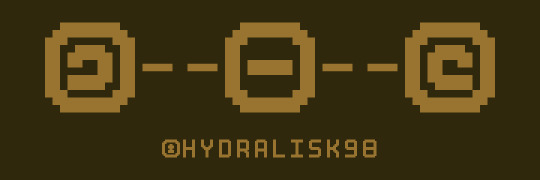
Copyright, the large landlords & proprietary ownership models pertain to the old Liberalism way of thinking (at least if we are to follow it under late-stage capitalism, liberalism and the philosophy of contemporary feudal US law). Not always bad and could really be better implemented as seen in the centuries prior to now.
(I mean, when things were less... structured, competitive, authoritative and rigid in the West and elsewhere, the autonomy and liberties allowed by such a paradigm of a abundance of workforce & income was nice to have and use, but not without some costs even then. Compared to now where things also have costs but as those grew for the low & middle classes and were not compensated by such rigid old models by the aging rich baby-boomers population yet, which is a shame considering all sides really could use a update / upgrade in their to persist in profits and long-term positive legacy.)
But as of today, it is so often misused and taken to extremely abusive extents as shown by the actions of major corporations going all over with massive-scale spying (look at Oracle data tracking record of like 5 billion people and growing), malevolent compliance (look at how both Apple and Microsoft comply heavily with US governmental guidelines for data collection, either by on-chip spyware or otherwise...), critical citizen censorship (like in Continental China, Russia and even the US of A as demonstrated by Edward Snowden's), corporate cooperation & corporative law-craft evils (Valve & Nintendo implicitly agreeing to shutdown Dolphin emulators on Steam, the way Microsoft-Mojang Minecraft falls apart over 1.19 update matters and how major corporations overall back each other up knowing their days are counted), vendor lock-ins, big tech oligopolies and marketshare dominions, expensive prices for very low value provided even for corporate agencies, too much managerial staff oversight control on decisions over workers, failing advertising economy, low-security bottlenecks with malware + botnets (thanks for the "infinite" loop of "security" with leaks, major failures & bulk password breakers trade market against consumers being traded against the will by black hat hackers & operatives that get paid by every irresponsible hidden or not governing bodies autonomously in lawful impunity, that unofficial though-police & cultural choices fails the potential of us all and will accelerate much the descent to further of a societal collapse that is entirely unnecessary if we are to rise to the stars on-time for the dream we were sold to in life), overstaffing & underpay (Amazon & every other mainline corporation abusing his employees for quicker short-term profit, paying very often low-as-in-slavery wages and Amazon taking full control of their employees' communication channels for drone promotion), menial purpose-less tasks and walled garden policies (looking at Apple's overpriced options being less competitive than the value and price paid for such, as well as the hopefully not soon Microsoft going onto such a exclusivity market that they alienate the best in their customer base into migrating away to non-exclusive environments like Linux), along many other situations / issues as revealed by information leaks & literal living in this global culture, both in explicit and implicit forms.
Copyleft, open source, free culture and library economy are the basics of our best bet to solve our current state of affairs, at least compared to what late-stage capitalists offer to us. Not the best thing forever more, but something quite more competitive and more appealing both short-term & long-term to the other corner in the licensing spectrum for the next few centuries, (or until the copyright catches up in given value to the customer and ethics to the lower classes fast but that's very unlikely due to the current rich folks' greed & ideology...) After all, today's enthusiasts, indie artists and modders are tomorrow developers, maintainers and architects.
Permissive licenses, public domain, and third-way alternatives?
~
Nuances on licensing
~
I have a fairly specific example in mind over one thing we should do better for despite the prejudices ill-fully distributed concerning AIs androids and other smart instruments. You see, as a sapient-kind that most likely desires progress and growth for yourself and potentially other individuals, we have a strong responsibility to cater and take care of both ourselves and every single thing we have agency over (to an agreeable extent ofc, not zealous over it) for both autonomous GAI agents and our current clade / species of humans alike... (there are likely aliens and further future humans species awaiting to be born from our efforts this century, unless the meta history is exclusively a job for some other elder sapient species coming before ourselves, which is extremely unlikely)
Seeing how the current mainstream APIs (even OpenAI and Stable Diffusion's) and datasets available for generative AIs, machine leaning models and other such autonomous agents are quite unethical / illegally acquired and heavily biased against a few core values we share instead of promoting the better parts of our psyche and species, I wanted to point out and encourage the independent & humanist re-developments of such technical promesses before the time when we might lose fully those freedoms / rights to develop the very basics of such future-oriented infrastructure.
After all, if we desire to make sure of both growth, progress, autonomy and abundance for us and our species now and onwards, we need to make sure that we get the rightful tools for stellar expansion on-time. And among those Quality-of-Life things that will help us by far for such a purpose and more will be a benevolent GAI (modular?) system. And that takes initial efforts and gentle caring humane guidance to show and bias such a GAI module into the brighter futures that we aim for really. Also, we should not screw up the future of our species (and other sapients') seeing how grand, and magnificent those futures are really headed towards. (See Stellaris, Isaac Arthur, melodysheep and Kurzgesagt)
That being said, I design my constructed world for multiple purposes including to emulate / simulate history, learn & develop my skills, advocate for my worldview and show to each and everyone why how and what matters for the prosperity of the whole species.
youtube
~?
youtube
Of course, here is the not-so-surprising cliffhanger twist ending of how all of it relates to (Woodrow) Wilsonism, global politics, socio-economics & the last half-millenium of historical patterns...
But that's for a later article. So take care and farewell!
0 notes
Text
Most people don't care about privacy or freedom. Libre software needs to stop using these as selling points.
0 notes
Text
The next version of Tux Paint will include some brief descriptions of many brushes.
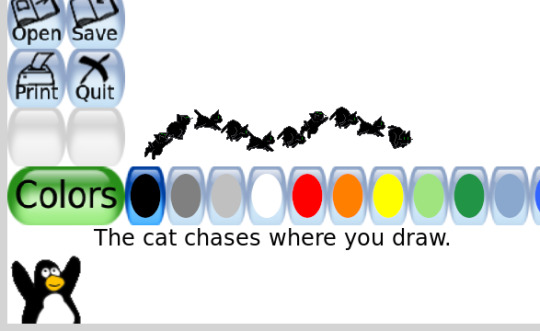
26 notes
·
View notes
Text
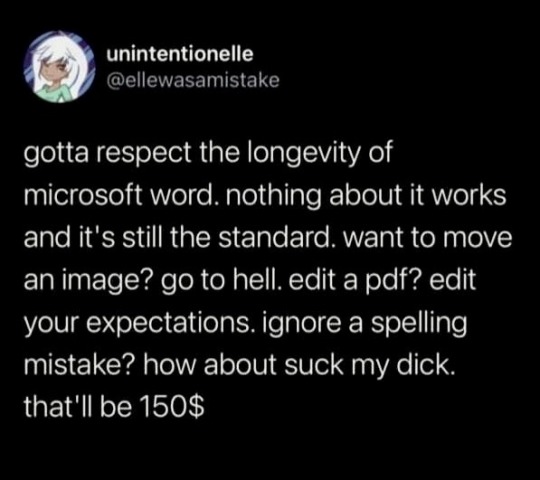
If someone asks me my advice as a professional writer, here it is—DON'T WRITE IN MICROSOFT WORD.
Writing a novel? Get Scrivener. Writing a screenplay? Use Final Draft. Make the investment.
Otherwise? Libre Office. Apple Pages. Google Docs if you're not worried about security.
DO NOT USE MICROSOFT WORD. DO VOTE GIVE THEM MONEY. NO PRODUCT THAT BLOATED AND UNUSABLE DESERVES TO SURVIVE.
#microsoft must die#ms word sucks#libre office#apple pages#google docs#writing software#scrivener#final draft#microsoft#ms word#fiction writing#my writing#writers#writing#clarion west#novelist#novel writing
4 notes
·
View notes
Text
#1 destination for finding software and services
We’re the #1 destination for finding software and services
Verified Reviews 2 million verified reviews from people like you to get the insights you need
Proprietary Insight 500+ softwarereviewforall Shortlist reports to narrow down your options and save you time
Expert Guidance Personalized software recommendations from human advisors in less than 15 minutes
Satisfied customer / FROM OUR USERS "softwarereviewforall helped us get insights from other people in our industry to make a better, more informed decision." JOSH D. Sales Engineer
Please note that "softwarereviewforall" is a placeholder, and you should replace it with the actual name or website you want to use in your text.
#software review#software reviews#antivirus software review#mint software review#you need a budget software review#jira software review#quicken software review#reaper software review#zoho software review#software testing review#xero software review#gimp software review#libre software review#topaz software review#software review sites#software review websites#software review site#nch software review#audacity software review#tax software review#video editing software review#4 vs 4s#best tax software 2023#avalanche software#what type of software controls the hardware of a computer?#hogwarts legacy review#procore#clipchamp review#shotcut review#stessa review
12 notes
·
View notes
Text
I've been using free and open-source software for nearly a decade at this point, and yet whenever I want to open up LibreOffiice I instinctively type "Word" or "Excel" in my OS's search menu.
4 notes
·
View notes
Text
Just spent like an hour looking for a free program to do a thing that I want to do only to find out libre office is probably my best bet. Why I didn’t attempt to use it in the first place is a mystery.
5 notes
·
View notes
Note
Happy STS, Ari!
I'm currently fighting for my life looking at Grammarly. Are there any tools you use when writing? Any favorites?
Happy STS and thank you for the ask!
Mostly Microsoft Word, to be honest. I've used LibreOffice for a while (since I refuse to pay a subscription service and I couldn't use the free version from Uni between Bachelor's and Master's), but it kept crashing on me and I find the UI rather unpleasant. Word does what I want and I know how formatting works.
Since I started writing as a hobby, I've also started to use 4thewords for motivation. It makes the "yay, fancy Avatar dressup" and "have to collect everything" parts of my brain go brrrr.
Oh, and I find Google Docs very useful for everything collaborative.
#sts#sts ask#storyteller saturday#ari answers asks#once I find a software that does what I want I tend to stick with it to be honest#and anything that crashes frequently is a no go#that is the main thing that drove me away from libre office and open office#both just kept crashing#Word and Excel both#I lost so many hours of work because of that#Even once I started saving after every few sentences#never mind that the need to save constantly absolutely killed my flow
2 notes
·
View notes
Text
My GNU/Linux journey, part 1: Introduction
Hello and welcome back to my humble blog!
It has been a while (more like years, almost 3!), but here we are. This blog has been through a lot, mostly through so many comebacks and then hiatuses, again and again, but I always end up coming back and having new plans for it.
However, this time is, hopefully, different. The reason being me switching completely to FOSS (Free* and Open Source…

View On WordPress
8 notes
·
View notes
Text
I FUCKING LOVE OPEN-SOURCE SOFTWARE. I LOVE LEARNING HOW TO USE IT FOR EDUCATIONAL PURPOSES WITHOUT HAVING TO PAY FOR FUCKING SUBSCRIPTIONS.

#shout out to my homies:#blender#visual studio code#audacity#vlc media player#libre office#gimp#krita#mozilla firefox#I love you guys#fuck all the corpos that force me to pay monthly for something that I need#I'd rather make a full purchase fr like fuck that shit#fuck subscriptions#I really needed to get that off my chest#rant#computer software#computers#programming#open source
6 notes
·
View notes
Text
un saludo a los hermanos(?) Arbiser que en 1982 hicieron un juego de Truco en MS-DOS que posiblemente sea el segundo* o tercer videojuego más antiguo hecho en Argentina
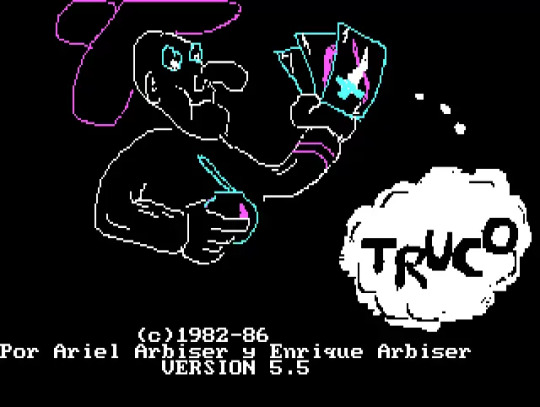
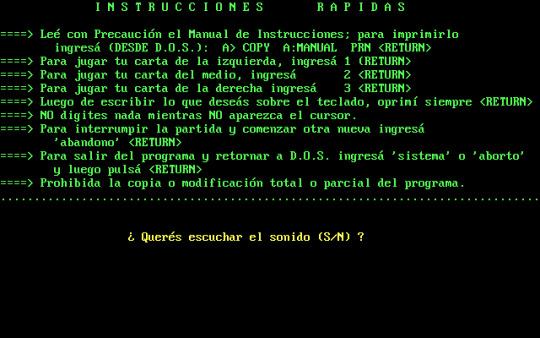

*el primero es un clon de la consola Magnavox Oddyssey hecha en los 70, para que se hagan una idea, predata al Atari, está registrado en un paper por ahí
14 notes
·
View notes
Text
Short sum for newbie system designer processor steps

Here are a few beginner projects for learning the ropes of customized computation architecture design:
Pana, a '4-4-4' instruction processor derived from Intersil 6100 & GaryExplains' but for 4-bit data. Uses the sixteen (16) RISC instructions shown by GaryExplains and only four (4) of its registers (ACC, PC, LN & MQ) as per of the Intersil 6100 specification. Doing as much work onto nibbles like an MVP Intel 4004 can, great as a BCD & Nibble data converter for later designs.
Tina, a barely expanded '4-4-8' processor derived from the "Pana" design, it uses more registers by adding twelve general-use registers (A-F, U-Z letters) and operate onto a single byte of data at a time. Great for two nibbles operations, byte-wise interoperability and 8-bit word compatibility with all sorts of modern processors from the seventies-onwards.
Milan, a '6-2-24' strong hybrid 8-bit / 12-bit processor derived from the "Tina" design, operating onto three bytes or two tribbles of data at once depending of use-case, while fitting in exactly 32-bit per instruction. Aimed at computing three 8-bit units, enabling 16-bit & 24-bit compatibility as well as up to two tribble operands. A great MVP implementation step towards my next own tribble computing architecture and a competitor to the Jack educational computer as shown in the NAND2Tetris courseware book.
When I am done with such, I will be onto three tribble-oriented architectures for lower-end, middle-end and upper-end "markets". Zara being lower-end (6-bit opcode, 6-bit register & 36-bit data = 48-bit instructions), Zorua being mid-end (8-bit opcode, 8-bit register and 48-bit data = 64-bit instructions) and Zoroark being upper-end (12-bit opcode, 36-bit register and 96/144-bit data (so either eight or twelve tribble operands worth of data) = 144/192-bit instructions, aiming to emulate close enough to an open-source IBM's PowerISA clone with VLIW & hot-swap computer architecture).
By the way, I haven't forgotten about the 16^12 Utalics game consoles and overall tech market overview + history specifications, nor have I forgotten about studying + importing + tinkering around things like Microdot & Gentoo & Tilck. I simply need to keep a reminder to myself for what to do first when I shall start with the computation engineering process. Hopefully that might be interesting for you to consider as well... Farewell!
EDIT #1
youtube
Tweaked and added some additional text & considering studying various aspects of Linux and overall copyleft / open source culture engineering scene, especially over Gentoo alternative kernels & hobby / homebrew standalone operating systems (GNU Hurd, OpenIndiana, Haiku... as well as niche ones like ZealOS, Parade, SerenityOS...) as to design a couple computation ecosystems (most derived from my constructed world which takes many hints from our real-life history) and choosing one among them to focus my implementation efforts onto as the "Nucleus" hybrid modular exo-kernel + my very own package modules collection. (Still aiming to be somewhat compatible with existing software following Unix philosophy principles too as to ease the developer learning cost in initial infrastructure compatibility & overall modularized complexity; Might also use some manifestation tips & games to enrich it with imports from said constructed world if possible)
2 notes
·
View notes
Photo
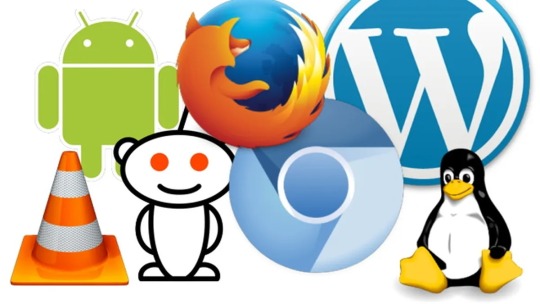
El Día Mundial del Software Libre o Día Mundial de la Libertad del Software, es un evento que se impulsó en el año 2004 y se celebró por primera vez el 28 de agosto de ese año, para luego fijarlo en el tercer sábado de septiembre.
El propósito principal de este día, no es simplemente dar a conocer las ventajas del software libre y los programas de este tipo más utilizados. También, los equipos que lo impulsaron, desean que a partir de las charlas educativas que ocurren ese día, se promueva el uso de estas herramientas para el beneficio de la sociedad en general.
¿Qué es software libre?
Se entiende por software libre, todo aquel programa informático cuyo código fuente puede ser estudiado, copiado, modificado, mejorado y redistribuido sin costo alguno.
En palabras mucho más sencillas, el software libre, es un programa que se puede alterar y compartir, sin la necesidad de tener el permiso de su creador, por tanto no acarrea problemas legales, si se copia, altera o distribuye.
Ejemplos de software libres más famosos
Ares: Programa P2P (peer to peer), el cual permite buscar y descargar cualquier tipo de información a través de diferentes fuentes o usuarios.
Moodle: Un programa pensado para el área educativa, dado que permite crear espacios de aprendizaje en los que se pueden subir diferentes tipos de contenido y realizar evaluaciones online.
Gimp: Programa para edición de imágenes. Libre y gratuito. Distribuido bajo licencia GNU.
Wordpress: El programa número 1 para crear blogs, sitios web y tiendas online, sin tener conocimiento de programación, gracias a la adquisición de plantillas y plugins.
Notepad ++: Un programa de edición de código C++ y también para escribir notas que puedan ser leídas fácilmente en cualquier ordenador.
Audacity: Programa de edición y procesamiento de archivos de audio, a partir de diferentes fuentes o archivos.
Ventajas del software libre
En realidad, la principal ventaja que ofrece el software libre es la amplitud que da al estar libre de derechos de autoría y la posibilidad de generar cambios en el código fuente. Pero estas no son las únicas grandes ventajas que ofrece este tipo de programas, también tenemos:
Corrección retroalimentada: En el mundo de la programación, muchos programas deben superar una fase beta, que se refiere a una prueba en vivo del producto para detectar fallos. El software libre al entregar el código fuente, permite que estas pruebas o adaptaciones se realicen de forma conjunta por todos los miembros del grupo que hace uso de dicho programa, lo que no solo amplía sus posibilidades de desarrollo, sino que a su vez garantiza las mejoras necesarias para seguir a la par de los avances tecnológicos y las necesidades del mercado.
Licencia 'Copyleft': Como ya hemos mencionado el software libre no posee derechos de autor, pero si cuenta con ciertas cláusulas creadas por la comunidad de desarrolladores que se deben respetar al momento de cambiar o distribuir el programa.
¿Cómo puedes celebrar el Día Mundial del Software Libre o Día Mundial de la Libertad del Software?
La mejor forma de celebrar este día, es atreverse aprender a utilizar uno de estos programas, bien sea asistiendo a unas clases, pidiéndole ayuda a un amigo o simplemente ingresando a uno de los millones de video tutoriales de Youtube.
Pero el objetivo es adoptar el software libre en nuestras vidas, para así poder asegurar que más y más personas puedan tener acceso a la tecnología, porque en muchos casos la brecha digital y el analfabetismo tecnológico, son consecuencia del alto costo de muchos programas informáticos.
3 notes
·
View notes
Text
Tux Paint 0.9.32 is available!
A number of new tools have been added! Download it today for Windows, macOS, Android, Linux, or Haiku!
⦬ 1-, 2-, and 3-point perspective
Three pairs of new tools provide ways to easily sketch drawings in Tux Paint using 1-, 2-, and 3-point perspective, as well as adjusting the different perspectives' vanishing points. The drawing tools are similar to the Line tool, except only certain angles are possible, based on the position of the line relative to the vanishing points. For example, in 1- and 2-point perspective, lines may be drawn vertically and horizontally, but diagonally they must always be angled toward or away from the vanishing point(s).
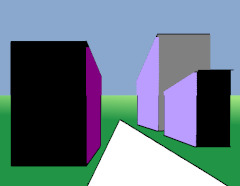
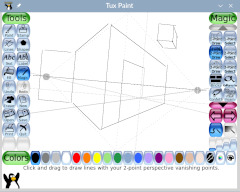

🧊Isometric, Dimetric, Trimetric, and Oblique
Another new set of tools provide ways to sketch drawings in an isometric projection, plus two other orthographic projections, dimetric and trimetric, as well as oblique. For the latter three, it's possible to adjust various drawing angles that each tool allows.

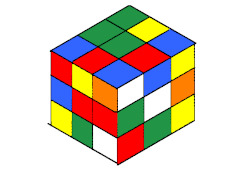
🟒Epitrochoid and Hypotrochoid
Two new tools have been added that draw "centered trochoid" curves — patterns created when one circle rolls around the inside or outside of another circle. The resulting shapes are similar to those created by devices such as the Spirograph. The radii of both circles, plus the position of the virtual pen relative to the moving circle, may all be adjusted.
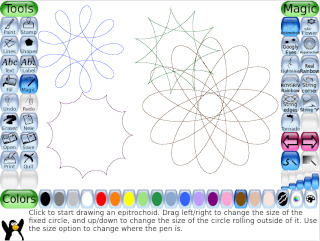
Read more in our press release.
39 notes
·
View notes
Text
ReShare lanza la iniciativa de desarrollo de software ReShare Digital para mejorar el préstamo de libros electrónicos en bibliotecas
ReShare, Author Project. «News Release: Project ReShare Launches ReShare Digital Software Development Initiative and Pledge Drive», 5 de junio de 2024. https://projectreshare.org/2024/06/05/news-release-reshare-digital/.
ReShare Digital
Project ReShare, una plataforma de código abierto y altamente escalable que admite flujos de trabajo de descubrimiento, cumplimiento y entrega, con un enfoque…
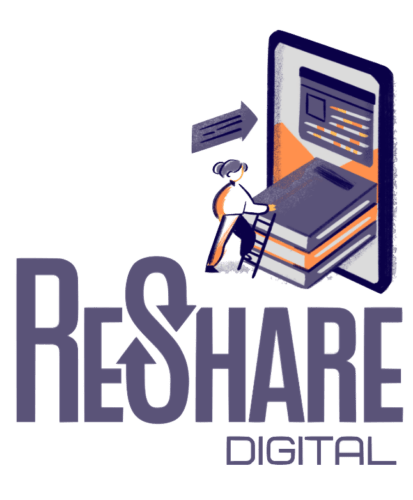
View On WordPress
0 notes
Text
RenderDoc the block
Today I solved the blocking issue in my Macana OpenGL project. I did it using RenderDoc, an open-source graphics debugger suggested to me by a colleague.
Since I'm a complete noob at RenderDoc (and not very proficient at OpenGL either), it took me awhile to gain traction. I didn't use the tool very effectively. But the key virtue of a good debugger is that helps users visualize what's going on. Somehow in the flood of details, I noticed that my problematic texture (which didn't have mipmaps) used a filter intended for mipmaps. And that proved to be my issue.
Meanwhile, I'm making progress configuring my new Linux Mint environment. I finally got the Cinnamon panel (analogous with the Windows taskbar) configured the way I like. I must've spent hours; it seems to me the Cinnamon UI could be a lot more intuitive.
Also I discovered I had 2 copies of LibreOffice: one installed from Apt and another installed from Flatpak. I only need one copy, so I'm removing the older (Apt) install to free up disk space.
#disk space#opengl#debugging#open source#computer graphics#accomplishments#free tools#textures#panel#linux mint#libre office#flatpak#duplication#software development#user interface#uninstall#war stories#traction#weird bug
1 note
·
View note